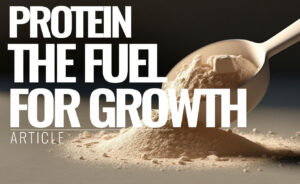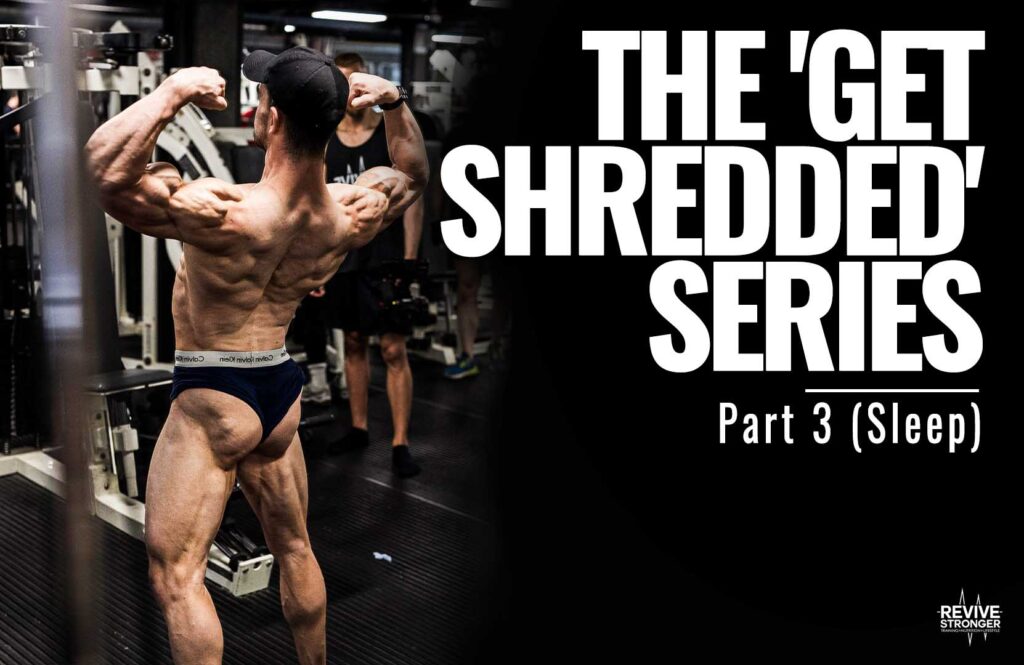
Revive Stronger
THE ‘GET SHREDDED SERIES’ PART 3 – SLEEP

So far we have set you up pretty well for shreds.
You’ve got your highly filling foods.
And you have set your surroundings up to promote your journey to striations.
But there is more to getting cut than just small bowls and protein fluff.
I’ve got some more tools in my get shredded tool bag to share with you.
Today we are going to talk about sleep and why it is important when it comes to dropping fat and maintaining muscle. Don’t you dare discount it, you might be thinking “pfft sleep, what difference does that make?” and I am going to tell you right now it could mean the difference between looking ripped and swole vs. looking like you don’t even lift. So read on, I dare ya, you might just learn something new, in fact I guarantee you will!
Table of Contents
Hit the Sack
By sack I mean bed, and by hit I mean get in it and go to sleep. Sleep has got to be one of the most underrated areas when it comes to our fitness and health. You might even be reading this thinking “sleep is for wussies” or “I haven’t got time for sleep” well before you judge, actually have a read about why sleep is so important for your results. Honestly if you’re not getting ample sleep you are shooting yourself in the foot, every single day.

- FEEL LIKE A MILLION DOLLARS
To me sleep is magical, it is like a dirty car going through a car wash, going in grubby and coming out sparkling, except you’re entering your bed tired and achey and waking up awake and fit. It is as important as nutrition when it comes to our ability to recover, you cannot eat some extra carbs to make up for crappy sleep. There is no shortcut.
The simple fact that it makes up more than a third of our time on earth should tell you that it is important. If you live to 90 that is over 30 years of sleeping! So it is really key for us to understand how we can get the most from it.
Right so I am gonna get a little sciency on you now, but only for a brief moment. There are two types of sleep; Non Rapid Eye Movement (NREM) and Rapid Eye Movement (REM). We enter NREM and then pass through ‘4 stages of sleep’ before ending in REM otherwise known as ‘deep sleep’.
Our body’s recovery gets jacked right up just before we enter deep sleep. What happens is our metabolic activity drops to its lowest, allowing our body to focus its energy on growth and repair. Growth Hormone (GH) is secreted; this is a very powerful hormone and sleep is the best way to naturally increase it along with exercise. You’ve no doubt heard of it, but to keep things simple just take it as it sounds, it promotes growth, it is anabolic, which is good. In addition melatonin is produced, that along with GH promote immune function. Which in turn reduces our chances of getting sick, and if we’re not sick we can train and stick to our diet more easily.
Personally if I nail my sleep a few nights in a row I feel a million dollars. When you are dieting your ability to recover is lower than usual because you have less fuel. Therefore you need to do all you can to maintain good levels of recovery and sleep is your answer. Sleep well and you will perform better day to day, which in turn will promote fat loss and muscle retention.

2) MAKE BETTER CHOICES
When we don’t get sufficient sleep we are more likely to make bad decisions. On top of that we get down, we’re less happy and optimistic. That is a frightful combo of things to happen, especially when you’re dieting.
You might be more willing to break your diet, or choose foods that later make it hard to stay on track. For example, when I was dieting I remember a day I felt awful, it was after a night of staying up on my laptop till 3am and getting only 4 hours sleep. That next day I walked past a corner shop which I’d normally not go into, but today I saw they had KitKat Peanut Butter bars on offer, I felt like I deserved it so went in and had purchased one. Down the hatch it went, damn it tasted so good. But, that was a big mistake, the bar contained a third of my total fat intake and 20% of my calories for the day, and it didn’t keep me full at all. The rest of the day I was hungry and annoyed, and I could have quite easily broken my diet. If I did this daily I’d completely ruin my chances of getting shredded.
Plus if you’re not happy and feeling pessimistic you might really question your fat loss pursuits, you might get fed up and quit. You might even decide to screw the gym, say no to your cardio and along with making crappy food choices you are in a very bad place.
So quality sleep is vital if we want to stay on track; dieting is hard enough as it is, don’t make your life harder!
3) CONTROL HUNGER HORMONES
Our hunger is managed in large part by the hormones leptin and ghrelin. When leptin is high our appetite is suppressed, we don’t want to eat. Whereas the opposite happens when ghrelin is high as it stimulates hunger. So when dieting we really want to keep leptin high and ghrelin low, as this will keep us from experiencing hunger pangs.
However, leptin is mainly released from our fat cells, which makes sense, our bodies like to stay the same, this is called homeostasis. So as you can imagine, as we lose fat, leptin comes down. Ghrelin on the other hand is released mainly from the stomach, when we eat it goes down and then over the following few hours it rises.
There have only been a couple of studies looking at human leptin or ghrelin levels during short term sleep deprivation. However in one study men were given 4 hours of sleep for 6 nights followed by 6 nights of 12 hours sleep, it was found leptin levels were 26% lower when sleeping for only 4 hours. Not good for keeping hunger at bay. In addition studies that have compared short sleeping times vs. longer times have seen a similar result, with leptin going down and ghrelin up in the subjects who slept less. As you might expect, when leptin is low and ghrelin is high people eat more, and this is consistent with the literature. So if you want to keep hunger away, sleep is darn important.
What makes this even more real is the fact that leptin levels are already plummeting and ghrelin is steadily rising. One because we are losing bodyfat, and so less is released and two because we are in a calorie deficit. In fact after 3 days of a 30% calorie deficit (which is a large deficit) researchers found leptin fell by 22%, which is 4% less than the sleep-deprived subjects. If that doesn’t give you enough of an incentive to get sufficient sleep, then I’m at a loss.
So if you get your sleep right you could prevent losses in energy expenditure, maintain higher levels of fullness and therefore help you get shredded.

4) BUMP YOUR METABOLIC RATE
Your metabolic rate is made up of a bunch of things, and a large part comes from your Non Energy Activity Thermogenesis (NEAT) and Non Exercise Physical Activity (NEPA). This is all the stuff you do outside of formal exercise, like walking the dog, going at it on Wii Boxing, taking the stairs etc. Although it has never been directly studied I think we can all say that when we don’t get enough sleep we feel drained and are less active as a result.
I know personally during my natural bodybuilding contest prep there were times taking the stairs was a struggle and if I had the choice I would opt for the lift. That would lower my NEPA and subsequently lower my total metabolic burn (or energy expenditure) which if done consistently could result in stalling my fat loss. So if I slept badly I definitely lost the will to take the stairs, go for walks and was more likely to lounge on the sofa. Thus, insufficient sleep reduced my energy expenditure, which could have stalled my fat loss.
Another kick in the backside is that fact those hunger hormones also impact our energy expenditure. Leptin when high increases our expenditure, so not only does it keep us fuller but it makes us more active. A win win for fat loss. Whereas ghrelin has shown to do the opposite, a lose lose for shredding the fat. I’ll note that this is more of a hypothesis at the minute, as studies done have mainly been on rodents.
Sleep is very important for keeping you performing at your best, if you miss out on that shuteye you’re likely to reduce your energy burn which could half your fat loss. Wave bye bye to shreds.

5) Avoid Muscle Loss
As trained individuals when we are in a long-term calorie deficit we are not going to be growing muscle. We therefore need to do everything in our power to retain the hard earned lean mass we have. Not only because we want to look like we lift once we’re diced but because muscle mass is more metabolically active, meaning we can eat more.
In a recent study they put participants into a 10% calorie deficit and looked at the differences in body composition changes when they provided them with 14 days of 8.5 hours sleep vs. 14 days of 5.5 hours sleep. The 14 days were separated by a period of 3 months, so they didn’t go from 8.5 hours to 5.5 hours suddenly. Throughout the two periods the calories participants took in and expended stayed very level, and as you might expect they therefore saw comparable weight loss, approximately 3kg over the 14 days. However, something scary happened, or at least for those of us that care about our muscles it was terrifying, when the participants were sleep deprived they lost a kilogram more muscle and a kilogram less fat. So when we do not get enough sleep we are more likely to burn muscle over fat.
I will however note in both groups they were in my opinion not consuming enough protein (18% of their total calorie intake). They also did not partake in resistance exercise, something else I think is key to maintaining muscle. However, we may hypothesise that when we do get our protein and training in check, we’re more likely to hold onto our muscle when we sleep enough.
If you miss out on time in the sack you could lose more muscle and less fat.
PRACTICAL APPLICATION
By taking small steps to improve your sleep you’ll see seriously positive results. In the same sense that if you continually discount your sleep you will eventually see very dire consequences. I know, I know there are so many great TV shows, films and video games to be played, and yeah they have their place, but there is always tomorrow. Personally I still struggle daily to get sufficient sleep, because our modern society can entertain us 24/7 but I know how much better I function with sufficient sleep so I am sure to prioritise it.
Hopefully by now you are realising that sleep is very important when it comes to getting shredded. You will perform better in the gym, you will make superior food choices, you will feel less hungry, your energy burn will be higher and you will safeguard your muscle, all of this will help you get to your goal. So how much do you need? And is it the quantity or the quality that matters?
Quantity and quality both matter; 1 hour of amazing sleep isn’t good enough, just like 8 hours of terrible sleep won’t do. Dan Pardi a Psychiatry and Behavioral Sciences Researcher identifies three main aspects to get right when it comes to getting the most out of our slumber:
- Timing – when you get your sleep
This is all to do with when you get to sleep, whether it be 8pm or 11pm. To get your timing right you want to play ball with what is called your circadian rhythm. This is essentially behavioural patterns our body likes to maintain across the day, sleep is just one of them. Our sleep behaviour is synchronised with our light and dark environment, and our bodies are ready for a certain behaviour at a particular time. When it is sunny outside it wants to be awake and when it is dark it wants to sleep. This can easily be disrupted by artificial light, shift work and travel.
⇒ Aim to get to get to bed and wake within the same hour every day.
- Intensity – the ‘phase’ you sleep in
The intensity of our sleep is all to do with the phases, as I discussed before there are 4 phases. You don’t want to keep moving into to phase 1 to 2 and then waking up, you want to go through all 4, and get ‘deep sleep’, as this is the most restorative.
⇒ ‘Deep sleep’ is important, set yourself up to allow for deep sleep.
- Duration – how long you sleep
This is the sum of your sleep through the day, so if you sleep 6 hours but then nap 1 hour too, you slept a total of 7 hours. However, as you saw timing of our sleep has a role, so not all durations are equal. How much do you need? It is quite individual and you should find your sweet spot, but studies suggest between 7 to 9 hours. The older and less active you are the less you will need, teenagers tend to need 9 hours whereas the older adult (65+ years old) would go for 7.
⇒ 8 hours sleep at the right time is better than an irregular 8 hours split into naps.
OK, so you have learnt a hell of a lot about sleep, which is great. You can see it is complex, and I would argue as important as your training and nutrition. So without further ado I will give you a strategy to maximise your sleep, which in turn will massively help your fat loss pursuit.

Why is Sleep so Damn Important?
- Superior Recovery so you can workout harder and keep your strength.
- Better decision making so you’ll be less likely to stray from your diet.
- Reduced hunger and improved satiation, keeping you sane.
- Higher energy burn, letting you eat more.
- Improved muscle maintenance, keeping your hard earned lean mass.
The importance of sleep is becoming increasingly known, and most of us do not get enough. If you take your goals seriously; you want to be the strongest, leanest best version of yourself you do not want to discount your sleep. Hit the hay properly, and you will streamline your journey to Shreddsvile.
If you missed out on Parts 1 & 2 I recommend you read them:
The ‘Get Shredded’ Series Part 1 – Food Selection
The ‘Get Shredded’ Series Part 2 – Environment
ABOUT STEVE

Stephen Hall is an online coach, natural bodybuilder and powerlifter based in the UK.
You can reach him at –
Instagram – @revivestronger
References
- Dinges D, Chugh D. Physiological correlates of sleep deprivation. In: Kinney J, Tucker H, editors.Physiology, Stress, and Malnutrition: Functional Correlates, Nutritional Intervention. Philadelphia, PA: Lippincott Williams & Wilkins; 1997. p. 668.
- Kristen L. Knutson, Karine Spiegel, Plamen Penev, MD, and Eve Van Cauter, The Metabolic Consequences of Sleep Deprivation. Sleep Med Rev. 2007 Jun; 11(3): 163–178. Published online 2007 Apr 17. doi: 10.1016/j.smrv.2007.01.002
- Spiegel K1, Leproult R, L’hermite-Balériaux M, Copinschi G, Penev PD, Van Cauter E. Leptin levels are dependent on sleep duration: relationships with sympathovagal balance, carbohydrate regulation, cortisol, and thyrotropin. J Clin Endocrinol Metab. 2004 Nov;89(11):5762-71.
- Arlet V. Nedeltcheva, MD,1 Jennifer M. Kilkus, MS,2 Jacqueline Imperial, RN,2 Dale A. Schoeller, PhD,3 and Plamen D. Penev, MD, PhD1. Insufficient sleep undermines dietary efforts to reduce adiposity. Ann Intern Med. 2010 Oct 5; 153(7): 435–441.
- Shlisky, Julie D. et al. Partial Sleep Deprivation and Energy Balance in Adults: An Emerging Issue for Consideration by Dietetics Practitioners. Journal of the Academy of Nutrition and Dietetics , Volume 112 , Issue 11 , 1785 – 1797
- https://sleepfoundation.org
We are a personal coaching service that helps you achieve your goals. We want you to become the best version of yourself.





